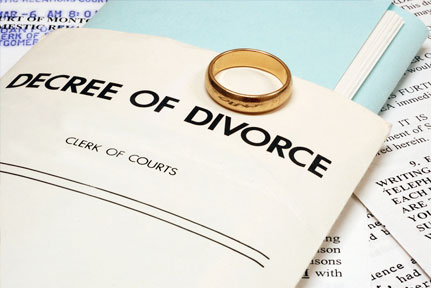
By M. Marcy Jones
Most people going through a divorce have certain expectations and end up surprised when things go off track. The reality is there is so much more involved in the divorce process than just the legal piece.
The truth is there are really Four Divorces happening all at the same time, and over a period of time. Everyone goes through each of these divorces differently and over different periods of time. The Four Divorces are:
- The Legal Divorce
- The Financial Divorce
- The Social Divorce
- The Emotional Divorce
As you and your spouse experience each of these divorces at your own pace, problems may come up that make communication difficult and disrupt attempts at settlement.
The Legal Divorce
The Legal Divorce is what most people think of when they think of “divorce.” It is simply the legal framework for finalizing your divorce. Papers are filed in the court initiating the process, certain procedures have to be followed, and then a judge will sign a document stating that you are officially divorced. The process varies by state.
A divorce is either contested or uncontested. A contested divorce is when the parties haven’t been able to reach an agreement on the issues involved and ends up in litigation with a judge making all the decisions.
An uncontested divorce is when both of you agree on how to resolve the issues regarding children, support, and division of property, and you have a written agreement which both of you have signed. When you are able to do this, then the legal divorce doesn’t take as long to complete. It’s also less expensive and less stressful than the contested divorce, and it can be finalized without going to court at all in most states.
The Financial Divorce
The Financial Divorce deals with your money, what you own, and what you owe. You need to make decisions about how to divide your marital assets and liabilities. These decisions can be difficult, as now the income that used to support one household will be supporting two. This is a harsh reality for many divorcing couples.
Being open, honest, and cooperative about the marital assets and liabilities makes this part of the divorce go more smoothly. If you have trouble getting through one of the Four Divorces, it’s unlikely you’ll be able to make the financial decisions necessary to complete the divorce process.
What happens if you can’t resolve your financial issues and have to take your divorce to court? You end up spending money on legal fees that should otherwise be going into your pocket and your spouse’s pocket. On the other hand, if you work together in either mediation or collaboration, you can create your own custom solutions that set yourselves and your children up financially for the best divorce situation possible.
The Social Divorce
The Social Divorce deals with how your friends and family adjust to the fact that you and your spouse are no longer together. Divorce is a family affair. Everyone around you is affected. Your friends, family, and co-workers have related to you and your spouse as a couple, and now they must learn to relate to each of you as single individuals. Each person reacts differently and on his or her own timetable. Be respectful and allow people to go through their own adjustments to the end of your relationship.
It’s helpful to keep your family and friends out of your divorce and keep the focus on what is best for you and your children. Your family and friends likely have strong feelings and support you, but their well-meaning advice often makes things worse.
The Emotional Divorce
This is the most difficult of the Four Divorces and the one that catches people off guard. Ending a marriage feels a lot like losing a loved one—it’s a loss you must grieve. If you’ve ever lost someone close to you, you know what this is like. Everyone goes through the emotional phase of divorce differently, just like everyone grieves in his or her own unique way. Not only do you grieve the loss of your spouse, partner, lifestyle, and dreams, but now you also have to figure out how to keep walking around on the planet with this other person in a socially acceptable way.
It is difficult to think clearly and to make good decisions when you’re in the early stages of this grief and recovery process. Being aware that it is a process, and knowing where you are in the process, is critical to you being able to make the best choices for you. Understanding that your spouse is going through this process as well can better help you understand his or her behavior and is especially important during settlement negotiations.
How you negotiate and communicate with one another during your divorce is always impacted by where each of you is in the Emotional Divorce. If the two of you are in very different places, you need to allow some time to pass before trying to negotiate anything except the most pressing matters.
In most cases, I recommend mediation or collaboration as the best choices for resolution because they allow you to take time-outs as needed and then to resume the process when the time is right. By understanding where you and your spouse are in each of the Four Divorces, you will be able to make conscious choices as you go along. You will be more mindful and thoughtful, better able to maintain your emotional balance, and able to make informed and responsible decisions.








